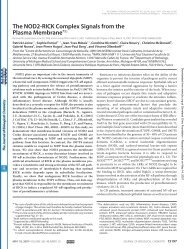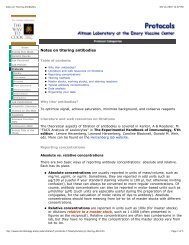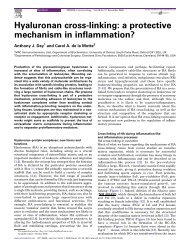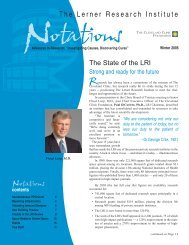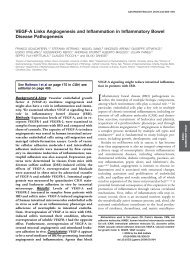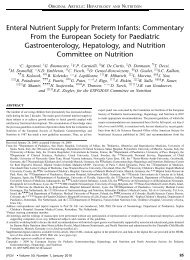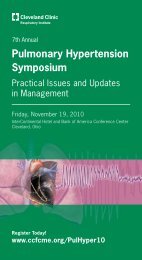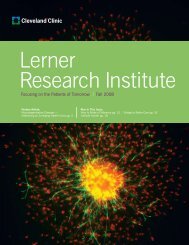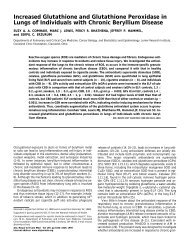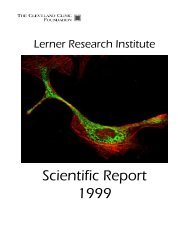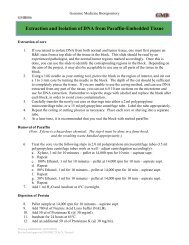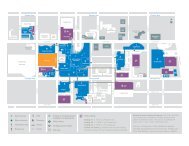Scientific Report 2003-2004 - Cleveland Clinic Lerner Research ...
Scientific Report 2003-2004 - Cleveland Clinic Lerner Research ...
Scientific Report 2003-2004 - Cleveland Clinic Lerner Research ...
- No tags were found...
Create successful ePaper yourself
Turn your PDF publications into a flip-book with our unique Google optimized e-Paper software.
We focus on p53-dependent mechanisms ofproliferation control. One direction of ourresearch involves identification and studyof mechanisms that are responsible for programmedp53 activation in response to such faults asabnormalities in cytoskeleton assembly, changes incell contacts, formation of micronuclei, changes incell ploidy, prolonged signaling from activated Ras,etc. The goal of our other research is the understandingof the functional role of missensemutations within the p53 gene in human cancer.We have identified several new gain-offunctionactivities of p53 mutants that contribute tothe malignant phenotype of cancer cells anddetermine increased resistance to cancer therapy.Particularly, we found that certain forms of p53mutant proteins increase resistance of cancer cells to5-FU and other fluoropyrimidine aniticancer drugsthrough specific activation of dUTPase genetranscription. We have been studying factorsaffecting expression of retroviral constructsdepending on the position of integration intorecipient cells, and conditions determining sustainedexpression of a transgene following multiple celldivisions. These studies have yielded several usefulretroviral vectors for tetracycline-regulatedexpression. Several state-of-the-art retrovirus-basedreporter constructs enable us to compare andmonitor activity of transcriptional factors afterintroduction into a wide range of cell types.One of the major goals is development ofapproaches for restoration of disrupted p53pathways in human cancer. The p53 gene is mutatedin almost half of cancer cases. In the other half, thep53 pathway is disrupted by other mechanisms.Many alterations in p53 interfere with induction ofapoptotic programs. The p53 pathway staysstructurally intact in cervical carcinomas, reflectinghigh efficiency that makes further mutationsunnecessary. Human papilloma virus gene productsare putatively excellent targets for discovery of drugsthat reactivate p53-dependent suicidal programs incervical carcinomas. In human tumors harboringmissense mutations within the p53 gene, theapoptotic response to exogenous wild-type p53 isalso well preserved. Therefore, selection of peptidesor small molecules that facilitate correct folding ofthr mutant p53 protein might restore the p53pathway, helping programmed elimination of cancercells. In our recent collaborative work with theKarolinska Institute, Sweden, a small molecule hasbeen selected from a chemical library that inducesapoptosis of tumor cells through reactivation ofmutant p53.To develop a system for high-throughputscreening of chemical libraries for small moleculesthat reactivate the p53 pathway in tumor cells, weintroduced our retrovirus-based reporter constructthat expresses β-galactosidase under control of a p53-responsive promoter into the HPV-positive cervicalcarcinoma cell lines HeLa and SiHa, and into severalThe Department of Molecular BiologyRestoration of Disrupted p53 Pathways inHuman Cancerhuman tumor cell lines bearing different pointmutations within the p53 gene. Testing of theobtained reporter cell lines revealed low backgroundβ-galactosidase expression and high inducibility of thereporter in response to introduction of exogenouswild-type p53. In collaboration with Quark BiotechInc., screening of a 46 k chemical library hasrevealed several distinct classes of small moleculesthat reactivate p53-specific transcriptional activity.Activation of p53 transcriptional activity results ininduction of p53-specific apoptosis and causesreduction of tumorigenicity in nude mice, both as amonotherapy and in combination with γ-radiation.We are currently working on identification of specificmechanisms of action of the identified p53-reactivating drugs.To study mechanisms of p53 inactivation intumors bearing wild-type p53, we are planning toidentify small molecules that reactivate p53 transcriptionalactivity in cell lines in which the cause of thedefect is not known. Identification of specific targetsof selected drugs might shed clues to the mechanismsof the defect. We introduced p53-specific reporterconstructs into several dozen human carcinoma celllines that express wild-type p53. Quantitative analysisof β-galactosidase expression following treatmentwith several types of p53-inducing drugs has revealedseveral cell lines with significantly impaired inductionof the p53-responsive genes. In addition, these samecell lines show greatly reduced induction of the p53-specific reporter after infection with recombinantadenovirus carrying wild-type p53. Some of the celllines have been selected for future screening ofchemical libraries for p53-reactivating compounds.We also study p53-dependent mechanisms thatregulate viability of cells following different stresses.Recently we described the novel hypoxia- and DNAdamage-induciblegene Hi95 that is involved inregulation of differential viability of cells to variousstress conditions through p53-dependent mechanisms.THE CHUMAKOVLABORATORYPOSTDOCTORAL FELLOWSLarissa Agapova, Ph.D.Andrei Budanov, Ph.D.VISITING FELLOWSGalina Ilyinskaya, Ph.D.Dmitry KotchetkovYulia KravchenkoOlga RazorenovaAnna Sablina, Ph.D.COLLABORATORSAndrei Gudkov, Ph.D., D.Sc. 1Alexey Ivanov, Ph.D. 2Pavel Komarov, Ph.D. 3Boris Kopnin, Ph.D., D.Sc 4Arnold Levine, Ph.D. 5Galina Selivanova, Ph.D. 21Dept. Mol. Biol. CCF2Karolinska Institute, Stockholm,Sweden3Quark Biotech, Inc., <strong>Cleveland</strong>4Russian Acad. of Sci., Cancer<strong>Research</strong> Center, Moscow,Russia,5Dept of Mol. Biol., PrincetonUniv., Princeton, NJPeter M. Chumakov, M.D.,Ph.D., D.Sc.Alexandrova A., Ivanov A., Chumakov P., Kopnin B., and J. Vasiliev (2000) Changesin p53 expression in mouse fibroblasts can modify motility and extracellular matrix organization.Oncogene 19:5826-5830.Sablina A.A., Chumakov P.M., Levine A.J., and B.P. Kopnin (2001) p53 activation inresponse to microtubule disruption is mediated by integrin-Erk signaling. Oncogene20:899-909.Pugacheva E.N., Ivanov A.V., Kravchenko J.E., Kopnin B.P., Levine A.J., and P.M.Chumakov (2002) Novel gain of function activity of p53 mutants: activation of thedUTPase gene expression leading to resistance to 5-fluorouracil. Oncogene 21:4595-4600.Budanov A.V., Shoshani T., Faerman A., Zelin E., Kamer I., Kalinski H., Gorodin S.,Fishman A., Chajut A., Einat P., Skaliter R., Gudkov A.V., Chumakov P.M., and E.Feinstein (2002) Identification of a novel stress-responsive gene Hi95 involved in regulationof cell viability. Oncogene 21:6017-6031.Bykov V.J., Issaeva N., Shilov A., Hultcrantz M., Pugacheva E., Chumakov P., BergmanJ., Wiman K.G., and G. Selivanova (2002) Restoration of the tumor suppressorfunction to mutant p53 by a low-molecular-weight compound. Nature Med. 8:282-288.105



